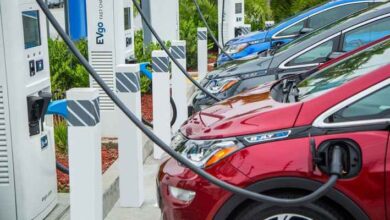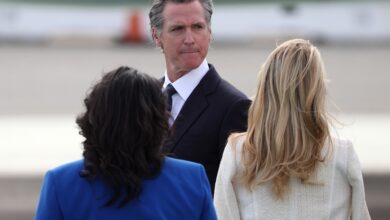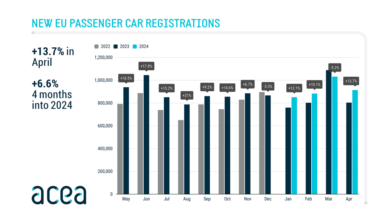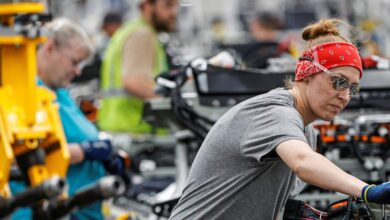Biden imposes ‘strategic and targeted’ tariffs on Chinese electric vehicles and batteries

President Biden on Tuesday slammed Donald Trump’s record on trade policy as he borrowed a page from his predecessor’s playbook by imposing a full 100 per cent tariff on Chinese-made electric vehicles and imposed or increased tariffs on a wide range of Chinese-made goods in an effort to prevent them from flooding US markets and hurting American industries.
Speaking in the White House Rose Garden as a light rain began to fall, Mr Biden said the actions he was announcing were meant to ensure that “American workers and American business … can compete and win in the industries of the future” because Americans “can outwork and outcompete anyone as long as the competition is fair”.
But Chinese state-owned competitors, he said, have long benefited from the Chinese government’s unfair trade practices.
“For years the Chinese government has poured state money to Chinese companies across a whole range of industries — steel, aluminium, semiconductors, electric vehicles, solar panels … and even critical health equipment like gloves and masks,” he said, adding that the government’s heavy subsidies for those state-owned enterprises let them “produce far more than than the rest of the world can absorb” with the end result of “dumping the excess products onto the market at unfairly low prices” and “driving other manufacturers around the world out of business”.
He recalled how the advent of cheap Chinese steel had devastated towns in Pennsylvania and Ohio in the early 2000s, costing thousands of workers their jobs.
“I’m not gonna let that happen again. That’s why today I’m announcing new tariffs in key sectors of the economy to ensure that our workers are not held back by unfair trade practices,” he said.
Specifically, the president said he was authorising 25 per cent tariffs on Chinese-made steel and aluminium meant to directly counter “Chinese overcapacity” in both sectors, in tandem with $1.5bn in investments his administration has made in supporting the construction of new, environmentally-friendly steel and aluminium facilities here in the US.
He also said he was imposing a full 100 per cent tariff on Chinese-made electric vehicles in an effort to ensure American dominance in that sector.
“We’re not gonna let China flood our market, making it impossible for American automobile manufacturers to compete fairly,” he said. Mr Biden also announced a 25 per cent tariff on Chinese-made EV batteries and one of the same percentage on China-sourced “critical minerals” used to make those batteries.
“I’m determined that the future of electric vehicles will be made in America by union workers, period. And we’ll do it by following international trade laws to do it,” he said.
The president added that the US and other American allies are making serious investments in EV infrastructure such as charging stations, and all parties involved want a supply chain for EVs “that isn’t dominated by unfair trade practices from China”.
“Americans can continue to buy any kind of car they want, whether it’s gas electric or hybrid. But we’re never going to allow China to unfairly control the market for these cars,” he said.
Mr Biden’s embrace of tariffs marks a return to Democratic trade policy from a bygone era, when it was mostly Republicans who favoured the free trade, laissez-faire policies that have been in place since the 1990s.
The US Trade Representative, Katherine Tai, told reporters at a daily White House press briefing that the announcement was “an important part of President Biden’s worker centred trade policy, which is about using trade to empower workers and making sure that they can compete fairly and thrive and supports the historic investments we have already made here at home”.
She also denied that the new tariffs were aimed at curbing China’s economic development and said they were instead meant to show that the administration will “insist on fair competition and defend American workers from the PRC’s unfair practices”.
The new emphasis on tariffs is bipartisan, with both Mr Biden and Mr Trump — his predecessor and likely 2024 general election opponent — employing them in their arsenal of tools against China.
The twice-impeached, quadruply-indicted ex-president did impose tariffs on Chinese goods, but he often lies about their effect by claiming that they caused the US to “take in” money “from China” — meaning that that the Chinese government was paying for the privilege of accessing the US market.
In reality, the tariffs are import taxes that are often passed on to American consumers.
Mr Biden said his approach was “strategic and targeted” and called it “a smart approach” compared with Mr Trump, who he said “failed” at combatting Chinese trade aggression.
“My predecessor promised increased American exports and boosted manufacturing, but he didn’t get either,” he said. “He signed a trade deal with China, they were supposed to buy $200 billion more in American goods”.
But the trade deficit with China “barely budged” under Mr Trump, he added, before noting that the deficit had been slashed to its’ lowest level in years during his own administration.
“We have the best economy in the world. And since I’ve come to office, the GDP is up, our trade deficit with China is down to the lowest level in over a decade and we’re standing up against Chinese government unfair economic practices,” he said.
Asked about Mr Trump’s recent comment that China was “eating our lunch” under his administration, Mr Biden replied: “He’s been feeding them for a long time”.



